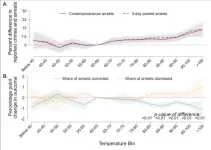(Press-News.org) May 14 2024 – A study in the Journal of the American Academy of Child and Adolescent Psychiatry (JAACAP), published by Elsevier, found that pharmacological treatment of attention-deficit/hyperactivity disorder (ADHD) reduced violence- and public-order related crimes. However, it did not reduce other types of crimes, among patients with ADHD in early to late adolescence considered to be in the grey zone (or on the margin) for such treatment.
This study uses variation in healthcare providers treatment preference as the basis for a quasi-experimental design that examines the effect of pharmacological treatment of ADHD on criminality among patients in the grey zone for treatment. Due to their healthcare providers’ treatment preference, some patients may not receive pharmacological treatment.
This study found considerable variation in rates of pharmacological treatment of ADHD between clinics, which impacted patients’ treatment. Pharmacological treatment of ADHD had a protective effect on violence- and public-order related charges, respectively, whereas there was no support for effects on other crimes (e.g., drugs, traffic, and property). Consistent with existing research this study also found that patients with ADHD had a higher risk of all types of crimes compared to the general population.
This is the first study to combine a quasi-experimental design with detailed population-wide registry data on types of crime and multiple years follow-up to assess effects of pharmacological treatment of ADHD on long-term criminal outcomes. Causal knowledge is challenging to establish since large-scale RCTs are ethically and practically unfeasible, while observational studies are limited by many potential confounding variables making treatment and control groups different. To address these issues, this study combines a quasi-experimental design with population-wide registry data on all patients aged 10 to 18 years who were diagnosed with ADHD in 2009-2011 (n=5,624), including their clinics, receipt of ADHD medication, and criminal charges with four years follow-up.
In these “instrumental variable” analyses, provider preference for pharmacological treatment acts as a source of randomization to treatment for patients in the grey zone for treatment where clinicians’ treatment decisions vary most. The logic can be illustrated by two patients with ADHD who are otherwise similar apart from one patient being treated due to seeing a clinician with a high treatment preference, whereas the other is not treated due to seeing a clinician with a low treatment preference. This study is conducted in Norway, importantly characterized by all treatment of ADHD among children and adolescents taking place in the public healthcare system with virtually no private sector, and providers are assigned by patients’ residence.
Pharmacological treatment of ADHD is commonly used in clinical practice, but the impact on crime remains debated. Some clinicians may hold a positive or “liberal” perspective, arguing that pharmacological treatment can reduce criminality by improving core symptoms of ADHD (inattention, hyperactivity, and impulsivity), whereas other clinicians advocate a negative or “restrictive” perspective based on concerns for medicalization, stigma and unecessary side-effects.
While this study finds evidence of causal protective effects of pharmacological treatment on criminality, these effects importantly concern specific types of crime for a particular patient group, and the effect sizes imply that many need to be treated to prevent one additional crime. Nonetheless, this study contributes novel causal knowledge of treatment effects that may be relevant for clinicians and researchers in their overall assessment of the effects of pharmacological treatment of ADHD.
This study was first-authored by Dr Tarjei Widding-Havneraas and is a part of the ADHD Controversy Project led by Professor Arnstein Mykletun, which uses this and similar research designs to examine multiple outcomes including crime, education, comorbidities, injuries, and mortality.
END
Does pharmacological treatment of ADHD reduce criminality?
New research in the Journal of American Academy of Child and Adolescent Psychiatry shines a light on ADHD medication and crime
2024-05-14
ELSE PRESS RELEASES FROM THIS DATE:
WCM awarded grant to study RNA processing in prostate cancer
2024-05-14
A team led by Dr. Eddie Imada, assistant professor of research in pathology and laboratory medicine, has been awarded a three-year, $1.5 million United States Department of Defense grant for research on a cellular process called alternative polyadenylation and its role in prostate cancer.
The grant was awarded under DoD’s long-running Prostate Cancer Research Program, a Congressionally-directed medical research funding project aimed at improving prostate cancer prevention, detection and patient care. Thousands of current and former servicemen ...
Artificial intelligence tool to improve heart failure care
2024-05-14
UVA Health researchers have developed a powerful new risk assessment tool for predicting outcomes in heart failure patients. The researchers have made the tool publicly available for free to clinicians.
The new tool improves on existing risk assessment tools for heart failure by harnessing the power of machine learning (ML) and artificial intelligence (AI) to determine patient-specific risks of developing unfavorable outcomes with heart failure.
“Heart failure is a progressive condition that affects not only quality of life but quantity as well. All heart failure patients are not the same. Each patient ...
People without an inner voice have poorer verbal memory
2024-05-14
Previously, it was commonly assumed that having an inner voice had to be a human universal. But in recent years, researchers have become aware that not all people share this experience.
According to postdoc and linguist Johanne Nedergård from the University of Copenhagen, people describe the condition of living without an inner voice as time-consuming and difficult because they must spend time and effort translating their thoughts into words:
“Some say that they think in pictures and then translate the pictures into words when they need to say ...
Courtship through flute song in Indigenous Southern Plains culture #ASA186
2024-05-14
OTTAWA, Ontario, May 14, 2024 – Every love story is unique, and in traditional Indigenous Southern Plains culture, it begins with an original ballad performed on the flute. In order to win a lover’s affection, and respect among the tribe, each pursuer must compose one good flute serenade.
Paula Conlon, a former music professor at the University of Oklahoma, has researched the history and cultural significance of the Indigenous flute since the 1980s. Conlon will present her work Tuesday, May 14, at 9:45 a.m. EDT as part of a joint meeting of the Acoustical Society of America and the Canadian Acoustical ...
SwRI investigating unusual substorm in Earth’s magnetotail using MMS data
2024-05-14
SAN ANTONIO — May 14, 2024 —Southwest Research Institute is investigating an unusual event in the Earth’s magnetotail, the elongated portion of the planet’s magnetosphere trailing away from the Sun. Using data from NASA’s Magnetospheric Multiscale (MMS) mission, SwRI scientists are examining the nature of substorms, fleeting disturbances in the magnetotail that release energy and often cause aurorae.
Since their launch in 2015, the MMS spacecraft have been surveying the magnetopause, the boundary between the magnetosphere ...
Mislabelled shark meat rampant in Australian markets, study finds
2024-05-14
Researchers at Macquarie University have found a significant portion of shark meat sold in Australian fish markets and takeaway shops is mislabelled, including several samples from threatened species.
The findings, published in the journal Marine and Freshwater Research this month, highlight the ineffectiveness of seafood labelling and the grave implications for both consumer choice and shark conservation.
Researchers collected 91 samples of shark meat from 28 retailers across six Australian states and territories and used DNA ...
90% of Floridians believe climate change is happening
2024-05-14
The latest edition of Florida Atlantic University’s “Florida Climate Resilience Survey,” found that 90% of Floridians believe that climate change is happening. In comparison, a recent Yale University survey showed 72% of all Americans believe climate change is happening. The FAU survey includes questions on beliefs about climate change, experience with extreme weather events and support for climate-related policies.
The Florida Climate Resilience Survey also shows belief in human-caused climate change has surged among Florida Independents while slipping among Republicans in the state since last fall.
But despite these changes, the latest edition of the survey ...
Using artificial intelligence to speed up and improve the most computationally-intensive aspects of plasma physics in fusion
2024-05-14
The intricate dance of atoms fusing and releasing energy has fascinated scientists for decades. Now, human ingenuity and artificial intelligence are coming together at the U.S. Department of Energy’s (DOE) Princeton Plasma Physics Laboratory (PPPL) to solve one of humankind’s most pressing issues: generating clean, reliable energy from fusing plasma.
Unlike traditional computer code, machine learning — a type of artificially intelligent software — isn’t simply a list of instructions. Machine learning is software that can analyze data, infer relationships between features, learn from this new knowledge and adapt. PPPL researchers ...
A new perspective reviews pork’s place in global sustainable healthy diets
2024-05-14
A new food systems perspective study1 published in Advances in Nutrition from the University of Washington is the first to explore the place of fresh pork in in the global food sustainability framework.
Merging data on food composition, food trends, prices and incomes, the study concluded that pork meat is an affordable high-quality protein and may have a lower environmental (GHGE) impact than previously believed. The perspective also makes clear pork is well positioned to meet the rising global demand for animal protein.
Pork is one of the most consumed meats globally,2 providing high quality protein and several priority ...
Heat’s effects on police and judges
2024-05-14
High temperatures affect the decision-making of police officers and judges. Previous research has shown that heat can increase criminal activity, with the leading theory proposing that heat reduces emotional control and increases aggression. A. Patrick Behrer and Valentin Bolotnyy investigate the effects of heat on the behavior of those who respond to criminal activity. The authors analyzed records of 10 million arrests across the state of Texas from 2010 through 2017, along with the legal outcomes that followed each arrest. These data were merged with daily temperature data. Police made fewer arrests per reported crime on the hottest days in the sample, and these arrests were ...
LAST 30 PRESS RELEASES:
The Lancet: New weight loss pill leads to greater blood sugar control and weight loss for people with diabetes than current oral GLP-1, phase 3 trial finds
Pediatric investigation study highlights two-way association between teen fitness and confidence
Researchers develop cognitive tool kit enabling early Alzheimer's detection in Mandarin Chinese
New book captures hidden toll of immigration enforcement on families
New record: Laser cuts bone deeper than before
Heart attack deaths rose between 2011 and 2022 among adults younger than age 55
Will melting glaciers slow climate change? A prevailing theory is on shaky ground
New treatment may dramatically improve survival for those with deadly brain cancer
Here we grow: chondrocytes’ behavior reveals novel targets for bone growth disorders
Leaping puddles create new rules for water physics
Scientists identify key protein that stops malaria parasite growth
Wildfire smoke linked to rise in violent assaults, new 11-year study finds
New technology could use sunlight to break down ‘forever chemicals’
Green hydrogen without forever chemicals and iridium
Billion-DKK grant for research in green transformation of the built environment
For solar power to truly provide affordable energy access, we need to deploy it better
Middle-aged men are most vulnerable to faster aging due to ‘forever chemicals’
Starving cancer: Nutrient deprivation effects on synovial sarcoma
Speaking from the heart: Study identifies key concerns of parenting with an early-onset cardiovascular condition
From the Late Bronze Age to today - Old Irish Goat carries 3,000 years of Irish history
Emerging class of antibiotics to tackle global tuberculosis crisis
Researchers create distortion-resistant energy materials to improve lithium-ion batteries
Scientists create the most detailed molecular map to date of the developing Down syndrome brain
Nutrient uptake gets to the root of roots
Aspirin not a quick fix for preventing bowel cancer
HPV vaccination provides “sustained protection” against cervical cancer
Many post-authorization studies fail to comply with public disclosure rules
GLP-1 drugs combined with healthy lifestyle habits linked with reduced cardiovascular risk among diabetes patients
Solved: New analysis of Apollo Moon samples finally settles debate about lunar magnetic field
University of Birmingham to host national computing center
[Press-News.org] Does pharmacological treatment of ADHD reduce criminality?New research in the Journal of American Academy of Child and Adolescent Psychiatry shines a light on ADHD medication and crime







